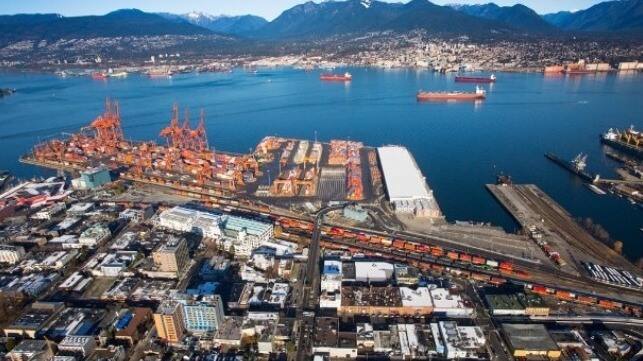Canada’s West Coast Longshore Contract Expires

The labor contract for Canada’s West Coast ports expired on Friday, March 31 with the union already saying that they are at an impasse with their employers. The Canadian federal government is becoming involved, deferring the possibility of strikes till at least June in what is likely to be protracted negotiations.
The last five-year contract covered over 7,400 longshore workers and foremen at the ports including Vancouver and Price Rupert, which collectively handle approximately 25 percent of the country’s imports and exports. Estimates are that the West Coast ports handle nearly C$300 billion worth of cargo annually (US$225 billion). The last agreement, which took approximately 18 months of negotiations and resulted in a brief lockout, sets the wages, benefits, hours of work, and employment conditions for the longshore workers.
The International Longshoremen & Warehouse Union Canada (ILWU) filed an official notice in November 2022 under Canadian labor law to commence the negotiations to renew the collective agreement with the British Columbia Maritime Employers Association. At the time they said they expected to begin discussions in January 2023, but the first meeting did not take place till February 16 during which proposals were exchanged and dates established for the negotiations in March and April.
After only a few sessions, the ILWU filed a notice of dispute on March 20 with the Federal Mediation and Conciliation Service. At the time, the union said it was taking that action because “there has been no meaningful progress with the BCMEA in discussions to renew the Industry Collective Agreement.”
Observers were left to speculate on what is happening due to the quick action to seek mediation. While it is the same process they followed for the prior negotiations the action came quicker than anyone anticipated. The Federal government which had fifteen days to act also moved quickly with the Minister of Labor appointing two conciliation officers on March 29.
The speculation varies between efforts to accelerate the process this time or deep divisions between the two sides. Before the start of the negotiations, the union made public comments saying that it was seeking significant wage increases. While both benefits and work conditions were expected to be discussed during the negotiations, the union’s primary concern is automation. Similar to the U.S. West Coast labor union which has yet to resolve its contract negotiations, the Canadian union is opposed to efforts toward port automation. It is likely to be a primary issue in Vancouver where they are working to build a new container terminal.

that matters most
Get the latest maritime news delivered to your inbox daily.
BCMEA in its statements has repeatedly said it has a “sincere objective of reaching a fair and equitable agreement that recognizes the efforts and skills of B.C.’s waterfront workforce, while also ensuring West Coast ports remain competitive, resilient, and affordable for all Canadians.” When the union filed its notice of dispute, the employer’s association emphasized the critical role the ports play in the economic and social well-being of Canada.
Under Canadian labor laws, the appointment of the conciliation officers starts a mandated 60-day period where they will seek to guide the negotiations. That period could be extended by the mutual consent of the two sides. At the end of the conciliation period, a further 21-day cooling-off period begins if there is no agreement. Observers are noting that based on that timeline it would be at least June before there could be a sanctioned strike or the employers would be permitted to lock out any workers.
